琼英仙洞
琼英仙洞
Qiongying Fairy Cave
集“险、秀、奇、绝”为一体群
Set "risk, show, strange and unique" as one group
文、图/许灵锋
Wen, Tu / Xu Lingfeng
说到中国的山洞群,不能不说到云南省凤庆县郭大寨乡琼英洞群,它以“险、秀、奇、绝”而著名,洞内有许多石田、石乳及许多奇形怪状的石头,有许多历代官员、名人的题名、题词,还有许多有关琼英洞群的传说和神话,历史悠久,文化底蕴深厚。琼英洞群是凤庆县的一大风景名胜,也是凤庆县的一大不可移动的文物,是国家宝贵的历史财富和文物。
When it comes to China's cave groups, we have to talk about qiongying cave groups in guodazhai Township, Fengqing County, Yunnan Province. It is famous for "danger, beauty, strangeness and uniqueness". There are many stone fields, stone milk and many strange stones in the cave. There are many inscriptions and inscriptions of officials and celebrities of all dynasties, as well as many legends and myths about qiongying cave groups. It has a long history and profound cultural heritage. Qiongying cave group is not only a major scenic spot in Fengqing County, but also a major immovable cultural relic in Fengqing County. It is a valuable historical wealth and cultural relic of the country.

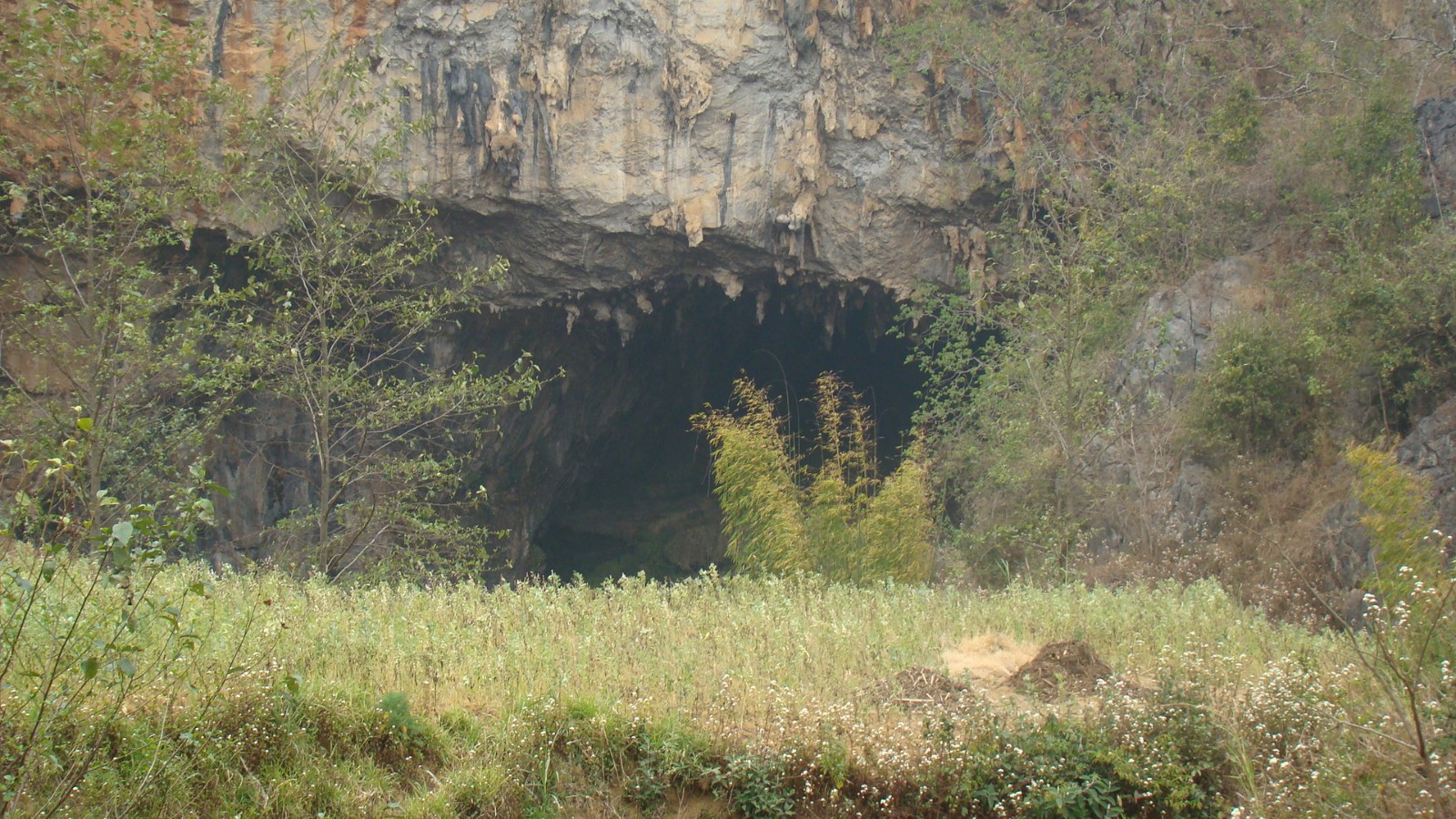
琼英仙洞
Qiongying Fairy Cave
琼英洞群之水洞位于凤庆县郭大寨乡西北部琼英村境内。洞的四周都是高山悬岩,洞口朝北,绿树成荫,深藏在南山峭壁之下,从北山坡往下看,洞口黑咕隆咚的,而又隐隐约约地缀满了吊灯般的石钟乳,可称之为“险”。洞内涓涓山泉,终年流淌,石田连片,小的似皱纹,大的如水池似月牙,活像村寨里的田园地块,可称之为“秀”。石田的形成则是每年夏天雨水浸溢的时候,开田的“神水”悄悄地从岩缝里探出来,从“坝水”头上又悄悄地往下淌,日久天长,石田从无到有,从小到大,奇迹般地出现在洞内,可称之为“奇”。洞始终往下延伸,行百十步,可闻到哗哗的流水声,洞内有两条小河,一左一右,从岩壁上钻出来,交汇在一起,顺洞流淌,终于打个漩涡从地下不知从什么方向流走,可称之为“绝”。
The water caves of qiongying cave group are located in qiongying village in the northwest of guodazhai Township, Fengqing County. The cave is surrounded by high mountain overhanging rocks. The cave faces north and is shaded by green trees. It is hidden deep under the cliff of Nanshan Mountain from the north slope Looking down, the hole is dark and vaguely covered with chandelier like stalactites, which can be called "danger". The cave is filled with mountain springs, flowing all year round, and the stone fields are continuous. The small ones are like wrinkles, and the large ones are like pools and crescent moons. They look like rural plots in villages, which can be called "show". The formation of Shitian is that when the rain overflows every summer, the "divine water" of Kaitian quietly probes out from the rock crack and flows down from the head of "dam water". Over time, Shitian miraculously appears in the cave from scratch and from small to large, which can be called "strange". The cave extends downward all the time, and you can smell the sound of running water. There are two small rivers in the cave, one left and one right, drilling out of the rock wall, intersecting and flowing along the cave. Finally, a vortex flows away from the ground in an unknown direction, which can be called "Jue".



琼英水洞内有许多历代官员、名人的题名、题词。例如:明嘉靖戊午年(1558)夏,顺宁(今凤庆)土知府勐寅在洞内留有“琼英仙洞”四字。民国元年(1911)夏,知府张汉皋寻幽到此,甚称其奇,诩为“诸洞之冠”。民国二年即拔款修整,选至悬岩下为游客栖息之所,并凿下“琼英洞”、“别有天地”等词语。民国四年冬,知县唐梦红约大理张肇兴同游,留下诗文数篇。民国二十五年,顺宁县长李锡桐留有“云窠”题词。陆军少校杨体仁、顺宁中学校长段显文,捐款架梯在洞内悬岩上请匠人凿下“桃源”二字巨匾。诗文还有许多,不一一列举了。在《顺宁县志》中录有康熙举人杨琼林的诗作:“古洞幽深别一天,五丁开凿不知年,铿锵石奏钧天乐,错落花生玉女钿。溪水带烟流竹外,野云扶雨过山巅,寻幽问得桃源路,恍惚归风葛稚川。”其中记载着世人因听琼英洞被称为“仙洞”慕名而来,寻幽至此的历史记录:“土酋孟民,曾率人秉烛行百里,洞豁然开朗,有大溪亘绝,隔岸有桃花浓艳,恨无舟渡。废然而返。因思武陵原非虚语。”
There are many inscriptions and inscriptions of officials and celebrities in qiongying water cave. For example, in the summer of the fifth year of Jiajing in the Ming Dynasty (1558), Meng Yin, the local magistrate of shunning (today's Fengqing), left the word "qiongying Fairy Cave" in the cave. In the summer of the first year of the Republic of China (1911), the magistrate Zhang Hangao came here, which was very strange and called "the crown of all caves". In the second year of the Republic of China, it was renovated with money, selected under the hanging rock as the habitat for tourists, and chiseled down words such as "qiongying cave" and "unique world". In the winter of the fourth year of the Republic of China, Tang Menghong, the county magistrate, asked Zhang Zhaoxing to travel with Dali, leaving several poems. In the 25th year of the Republic of China, shunning county magistrate Li Xitong left the inscription "Yunke". Army major Yang Tiren and Duan Xianwen, principal of shunning middle school, donated a ladder and asked the craftsman to chisel the giant plaque of "Taoyuan" on the hanging rock in the cave. There are many poems and essays, which are not listed one by one. In the annals of shunning County, there is a poem by Yang qionglin, a member of Kangxi's family: "the ancient cave is deep. On another day, five Ding digs do not know the year. The sonorous stone plays Jun Tianle, and the wrong falling flowers give birth to jade daughter Dian. Outside the stream with smoke and bamboo, wild clouds help the rain across the top of the mountain, seek the secluded Taoyuan Road, and return to the wind Ge Zhichuan in a trance. " It records the historical record that people came to qiongying cave because they heard that qiongying cave was called "Fairy Cave" and looked for seclusion: "the chieftain Meng min once led people to walk hundreds of miles with candles. The cave suddenly opened up. There are big streams, peach blossoms on the other bank, and there is no boat crossing. he returned to his native place much disappointed. Because thinking of Wuling is not an empty language. "
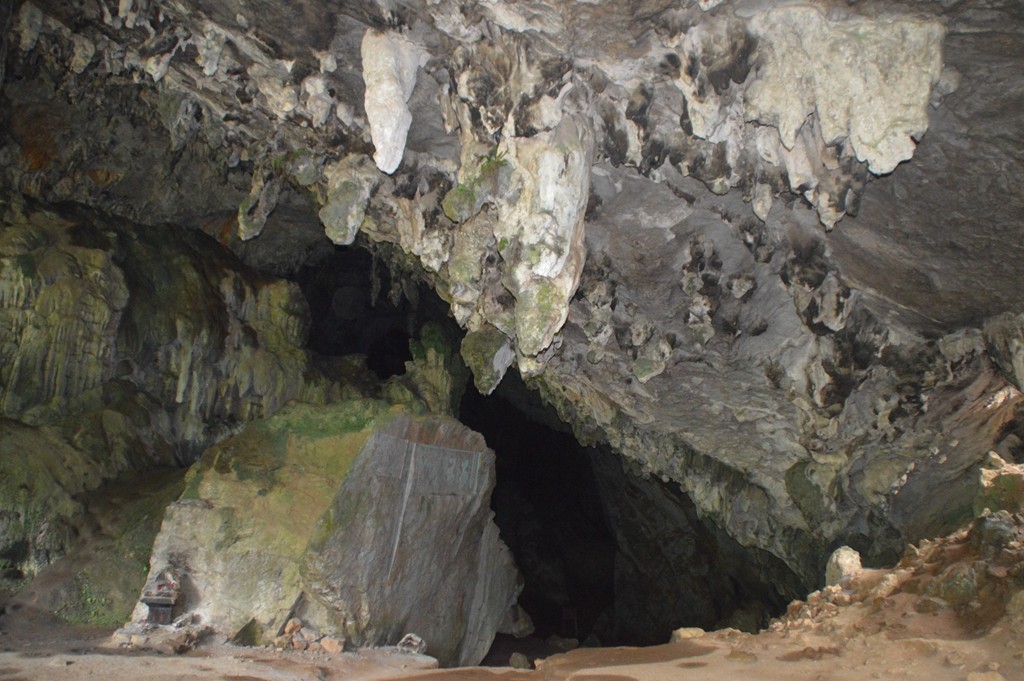
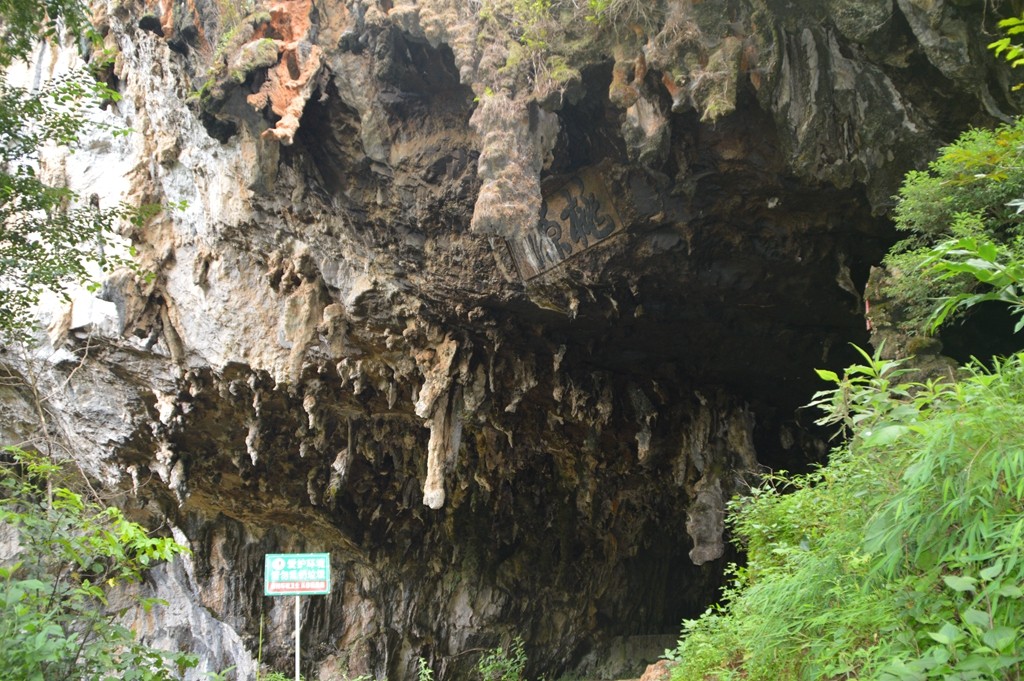
在当地流传着有关琼英洞的许多神话和传说。相传琼英洞原是仙人之天地,小河岸边都是桔子、香蕉和瑶草。有时天阴下雨,洞内就有“澎澎”的钟鼓声传出来,遥震十里。据当地人说:“每当天明,洞里‘古钟’下常有五六寸长的鸡爪痕迹和一尺二三寸大的男人脚印。”“道光年间,人们常见一个满身都有是小葫芦的老道人,天天在洞顶高悬的钟乳石上爬行睡觉……”还有许多流传的神话和传说,可现在的人已经不信这些了。
There are many myths and legends about qiongying cave. It is said that qiongying cave was originally the heaven and earth of immortals. Oranges, bananas and Yao grass are on the Bank of the river. Sometimes it's cloudy and rainy, and the sound of "pengpeng" bells and drums comes out in the cave, shaking ten miles away. According to the local people, "at dawn, there are often five or six inch long chicken feet and one foot two or three inch man's footprints under the 'ancient clock' in the cave."“ During the reign of Daoguang, people often saw an old Taoist covered with small gourds crawling and sleeping on the stalactite hanging high on the top of the cave every day... "There are many popular myths and legends, but people now don't believe these.
洞内景色优美,洞壁形态各异,有石钟、石乳、石田,洞的大小不一,清幽优雅,像读一首境界优美的诗,像看一幅造型奇特的画卷,让人觉得超凡脱俗,心情舒畅。每到雨季,琼英洞已灌满了水,无法入洞,待洞中水干时,石田里的水也干了。琼英洞其实是地下溶洞,洞内的水,听当地人说,流经五个地方,最近的是营盘镇,最远的是缅甸。
The cave has beautiful scenery and different forms of cave walls, including stone bells, stone milk and stone fields. The size of the cave is different, quiet and elegant. It is like reading a poem with beautiful realm and looking at a picture scroll with strange shape, which makes people feel extraordinary and comfortable. Every rainy season, qiongying cave is full of water and cannot enter the cave. When the water in the cave is dry, the water in the stone field is also dry. Qiongying cave is actually an underground karst cave. According to local people, the water in the cave flows through five places, the nearest is Yingpan Town and the farthest is Myanmar.
幽深的后洞
Deep back hole
后洞位于琼英村下后山小组境内,是对琼英水洞而言,属琼英洞群中的一支。后洞在离琼英洞一公里左右的山半腰,靠地下水与琼英水洞连为一体,深藏在茂密的草木丛中。洞穴阔而幽深,有栖息的岩燕。洞中很潮湿,洞的中央卧着一条雪白的石狮子,好似一位正在沐浴的少女。在白狮身后呆立着一头高大的石象,踏着哒哒的滴水从洞中走出来。石象旁趴满了长着褐色鱼鳞甲的石爬虫,似蛤蟆、似蜻蜓、似蜗牛,种类很多。在石象的背后,有一条蜿蜒的小河,河水从洞的石壁下钻出来,涓涓地绕过石象,又从洞的左侧石缝里悄悄地渗下去。
Houdong is located in xiahoushan group of qiongying village. It is a branch of qiongying cave group for qiongying water cave. The back cave is half a kilometer away from qiongying cave. It is connected with qiongying cave by groundwater and hidden in dense vegetation. The cave is wide and deep, with inhabited rock swallows. The cave is very wet. In the middle of the cave lies a snow-white stone lion, like a girl bathing. Behind the white lion stood a tall stone elephant, stepping out of the cave with dripping water. Beside the stone elephant, there are many kinds of stone reptiles with brown scales, like toads, dragonflies and snails. Behind the stone elephant, there is a winding river. The river comes out from the stone wall of the cave, trickles around the stone elephant, and infiltrates quietly from the stone crack on the left side of the cave.
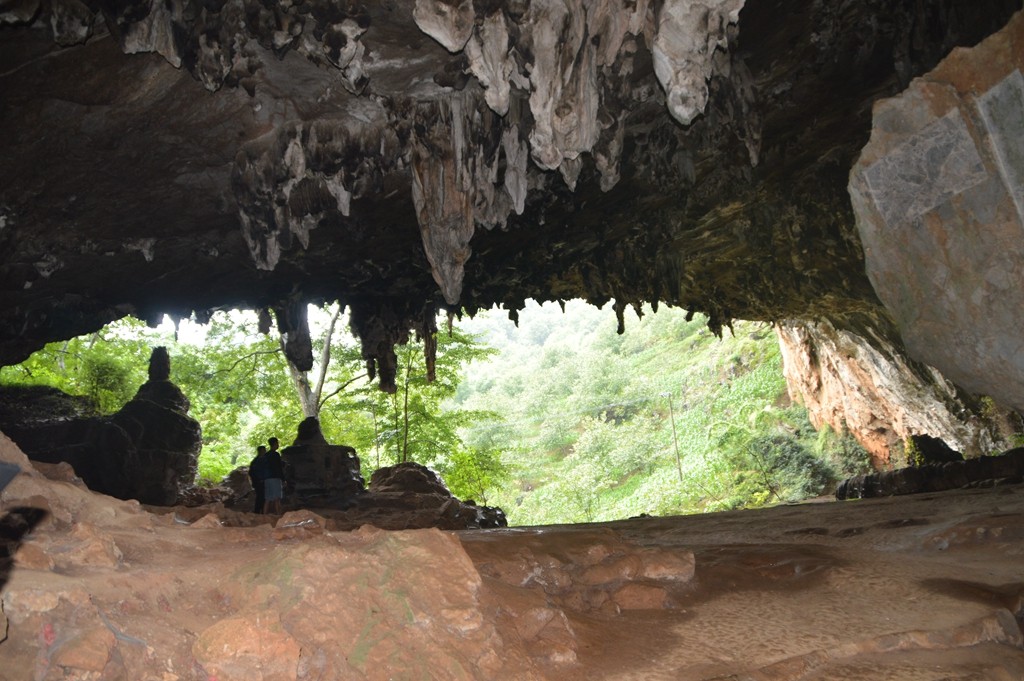
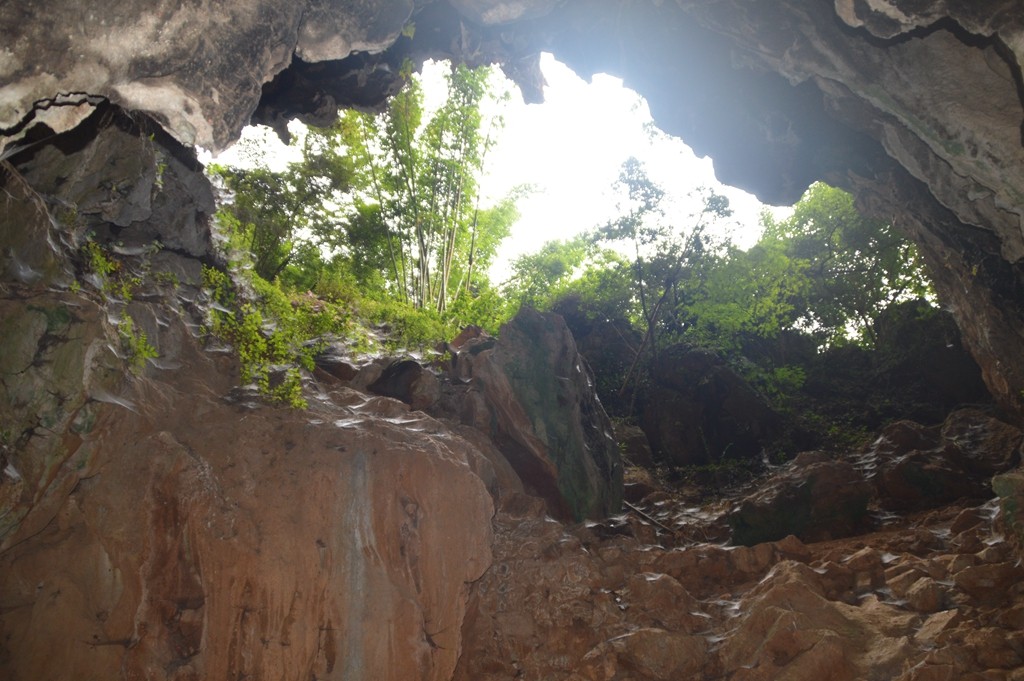
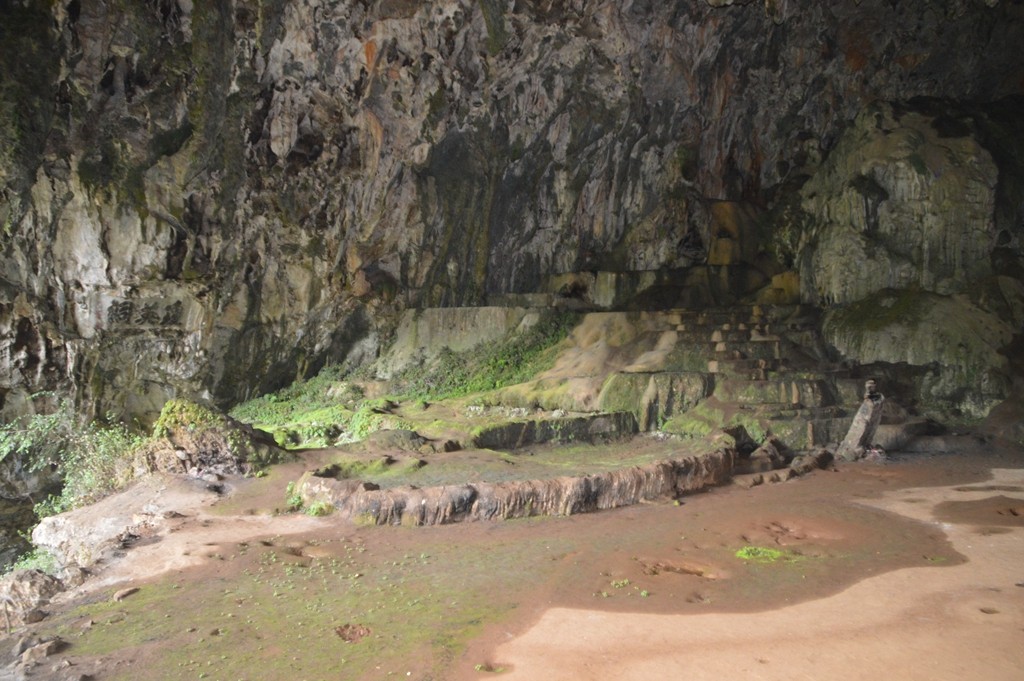

老龚洞位于琼英村上后山小组境内,所处的地理位置较高,在郭大寨乡和营盘镇交界处的山梁的东坡上,是琼英洞群中又一颗明珠。洞旁有仙洞、烧香洞和连成一片的大石林。周围是藤树攀满的岸峰,常有猴子出没,山头凉爽,白云常从这里飘过。站在洞口,登高远望,上下绝壁,视野格外开阔,洞外有一可容二十余人的平台。洞口很小,外表看好象一口倒挂着的黑铁锅,走进去看则宛如一座洋楼。岩石褐红,四壁辉煌,钟乳争奇,石柱悬空而下。洞分内外两厅,中间有门相遇,内厅有楼,要攀壁而上,有天窗。内外两厅有门旁,有一通道,时宽时窄,步步通幽。内有石田、钟乳、石笋,有顶天立地的栏杆支柱,长短扁圆,形态各异。在洞外平台内侧光滑的岩壁上刻有:“咸丰七年十月十二日,艮占顺宁(今凤庆)城,四处烧杀,人民不安。八年正月初二逃至高山岩穴避难……”等字样,这就是“老龚洞”之名由来的见证。据当地人说,清政府为了控制南疆,实行以汉制夷的政策,云南少数民族不能忍受汉族和清政府的压迫和歧视,于咸丰六年间,与滇西回民为代表的少数民族揭竿而起,反清反汉,相互厮杀。当时,立木爬社的龚小黑也跑到杜文秀的旗下,不久升为都督,主管粮草。义军失败后,都督逃到洞里避难。后来被他的随从推下山去,被清兵杀害。人们为了纪念龚小黑都督,便将这洞命名为“老龚洞”。
Laogong cave is located in the shanghoushan group of qiongying village. It is located in a high geographical position. On the east slope of the ridge at the junction of guodazhai Township and Yingpan Town, it is another pearl in qiongying cave group. Next to the cave are fairy cave, incense burning cave and a large stone forest. Surrounded by a bank peak full of vines, monkeys often haunt, the mountain is cool, and white clouds often float through here. Standing at the entrance of the cave, you can climb up and down the cliffs. Your vision is particularly wide. Outside the cave, there is a platform that can hold more than 20 people. The hole is very small. It looks like a black iron pot hanging upside down. When you go in, it looks like a foreign building. The rock is brownish red, the four walls are brilliant, the clock milk is strange, and the stone pillars are suspended in the air. The cave is divided into inner and outer halls. There is a door in the middle. There is a building in the inner hall. You should climb the wall and have a skylight. There is a passage beside the door in the inner and outer halls, sometimes wide and sometimes narrow, step by step. There are stone fields, stalagmites, stalagmites, towering railing pillars, long and short oblate, in different shapes. On the smooth rock wall inside the platform outside the cave is engraved: "on October 12, the seventh year of Xianfeng, Gen occupied shunning (today's Fengqing) city, burning and killing everywhere, and the people were disturbed. On the second day of the first month of the eighth year, he fled to high mountain caves for refuge... "And other words, which is the testimony of the origin of the name of" Lao Gong cave ". According to local people, in order to control Southern Xinjiang and implement the policy of using han to control foreigners, Yunnan ethnic minorities could not stand the oppression and discrimination of Han and Qing government. During the six years of Xianfeng, they rose up against Qing and Han ethnic minorities represented by Hui people in western Yunnan and fought against each other. At that time, Gong Xiaohei of Limu climbing club also ran to Du Wenxiu's banner and soon became governor in charge of grain and grass. After the rebel army failed, the governor fled to the cave for refuge. Later, he was pushed down the mountain by his entourage and killed by the Qing army. In order to commemorate governor Gong Xiaohei, people named the cave "old Gong cave".
琼英洞群包括水洞、后洞、老龚洞,一洞一个天地,一洞比一洞高,集“险、秀、奇、绝”为一体,历史文化悠久,底蕴深厚,是游玩休闲的好去处、好景致,是凤庆县一大不可移动的文物,是国家的历史财富和文物,开发、利用价值高,具有很高的文物价值和旅游价值。现郭大寨乡党委、政府已把琼英洞群作为旅游开发、景点保护的一个项目来抓。
Qiongying cave group includes Shuidong, Houdong and Laogong caves. One cave is a world, and one cave is higher than another. It integrates "danger, beauty, wonder and uniqueness". It has a long history and culture and profound heritage. It is a good place for play and leisure, a good scenery, a major immovable cultural relic in Fengqing County, a national historical wealth and cultural relic with high development and utilization value, It has high cultural relics value and tourism value. Now the Party committee and government of guodazhai township have taken qiongying cave group as a project of tourism development and scenic spot protection.
琼英洞附近产的古树茶更是知名海内外,有一株被中国农科院茶叶研究所的专家列为46株古树茶之一来保护,前来参观购买古树茶的游客、茶商很多,被这里的生态所吸引,称之为“世外桃源”,因为琼英洞里有“桃源”的题词。
The ancient tree tea produced near qiongying cave is well-known at home and abroad. One is listed as one of the 46 ancient tree tea by experts from the Tea Research Institute of the Chinese Academy of Agricultural Sciences. Many tourists and tea merchants come to visit and buy ancient tree tea. They are attracted by the ecology here and call it "paradise", because there is an inscription of "peach garden" in qiongying cave.
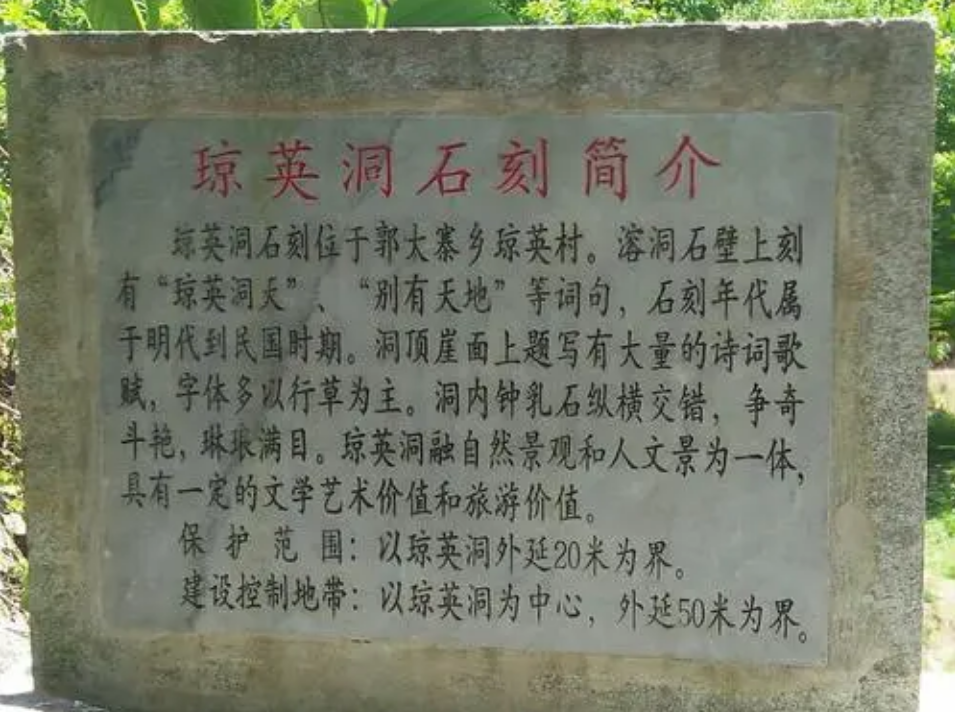

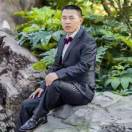
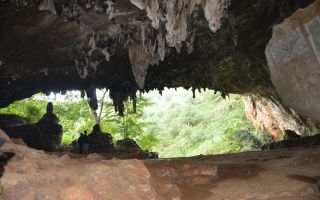
0 条 评 论 Write a Response